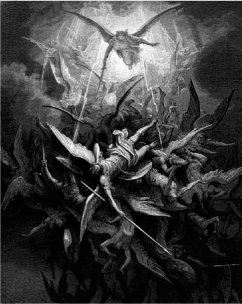The World MythWar in Heaven and the Creation |
What are the components—and general significance—of the creation story in the world myth? |
The creation myth is universal because we all wonder where we came from. Humans have always wondered where they came from as individuals, and particularly as cultures. The world creation myth is expressed in several basic approaches. The most popular of these approaches is the ex nihilo creation—the creation from nothing. Another type of creation prominent in the world myth is the creation from the undifferentiated void—especially the cosmic egg or primordial maternal waters. Still another approach to creation is by way of the procreative power of the world parents, gods who existed before the universe and who joined together to begin the creative process. Nearly always these parents—Geb and Nut in Egypt, Rangi and Papa in Polynesia, for example—have to be separated so that the particulars of creation can develop between them. In some cases a single world parent such as the Norse Ymir or the Babylonian Tiamat must be sacrificed so that his or her body can become the world. The first people emerge from all these processes that make up the archetypal world myth. It is, of course, most important that we humans know where we came from.

The theme of a war in heaven is shared by many cultures. In this illustration from John Milton’s Paradise Lost, the angel Michael throws the rebellious angels out of heaven.
